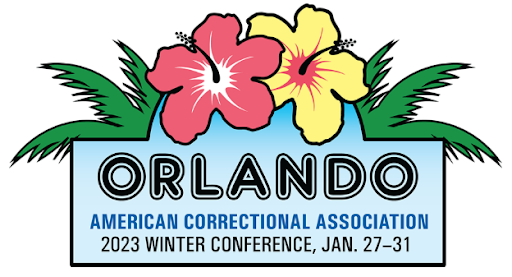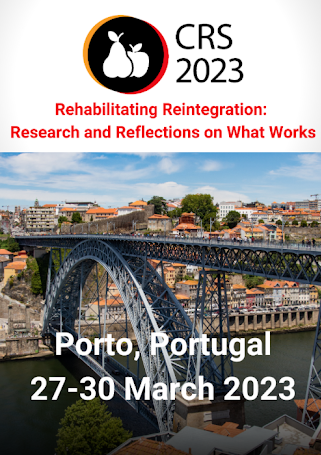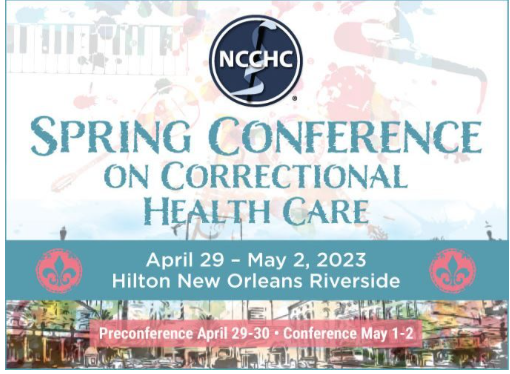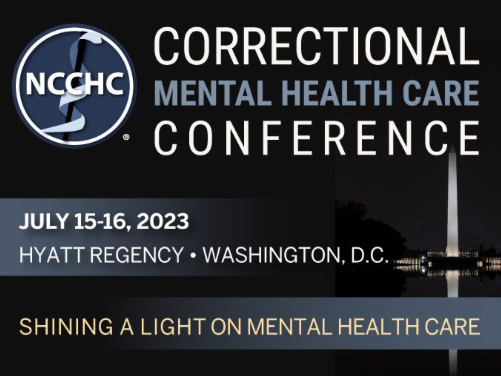
We've compiled top highlights from recent research, policy, and practice resources across the world for our latest IACFP International News summary. Our topics for November and December, 2022 include IACFP updates, recent research, emerging practices, and upcoming conferences.
1. IACFP Updates
- The IACFP membership has elected Dr. Emma Regan as IACFP President-elect. Her term will begin on 1 January, 2023. Dr. Regan currently serves as Head of Psychological Services for the Irish Prison Service.
- The day before the IACFP Board met in November 2022, the IACFP Europe Board met for their annual meeting. The IACFP Europe Board includes Frank Porporino, Diane Williams, and Javel Jackson, all of whom are IACFP board members. Melvin Hinton, IACFP President-elect, and Gabriel Ong, IACFP board member, attended the meeting to learn more about the IACFP Europe projects and for the discussion on how IACFP Europe might best contribute to the overall IACFP international strategy.
- One of the agenda items was an update on two EU funded projects that IACFP Europe contributes to as a project partner. The projects are:
- REEDU, an inclusive approach to inmate social rehabilitation and education
- MIRAD, which stands for Multi-Ideological Radicalisation Assessment Towards Disengagement. The focus of the project is:
- Fostering expanded collaboration in the field of disengagement and reintegration programmes;
- Building tools to assess credibility and trustworthiness of community organisations;
- Implementation of risk assessment tools, addressing the necessity to develop and apply ideology-specific risk assessment tools, attentive to relevant gender dimensions of appropriate interventions; and
- Training to support knowledge and collaboration.
More information on MIRAD can be found at https://mirad-project.eu - The REEDU project team met 21-22 November, 2022. IACFP representatives attending were Frank Porporino and Cherie Townsend. Project partners representing Slovenia, Romania, Bremen, and Malta were also in attendance. The focus of the transnational partnership meeting was to:
- Receive final document, Systemic Approaches in Rehabilitation in a Prison Setting, which provides the theoretical foundation for the project;
- Review the guidelines for developing and implementing a project-based learning effort;
- Review the status and results to date of the four pilot projects; and
- Conduct a study visit to the Malta prison, Corradino Correctional Facility.
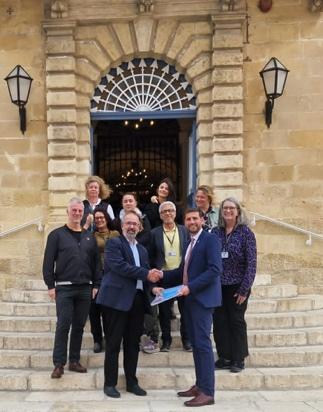 The study visit was hosted by Robert Brincau, CEO of the Correctional Services Agency, and Chris Siegersma, Commissioner for the Welfare and Development of Prisoners. As noted in this photo, much of the facility is classic, old prison infrastructure, but they have also done significant renovations to include a state-of-art medical clinic and offices for a multi-disciplinary rehabilitation unit (CRU) of 32 professional staff. They are implementing modern correctional principles and best practices, which includes working toward being trauma-informed. The leadership, correctional staff, and commitment to better outcomes was impressive. Photo shows Joe Giordmaina, University of Malta, presenting Chris Siegersma, Commissioner, with a copy of Systemic Approaches in Rehabilitation in a Prison Setting, on behalf of the REEDU transnational partnership.
The study visit was hosted by Robert Brincau, CEO of the Correctional Services Agency, and Chris Siegersma, Commissioner for the Welfare and Development of Prisoners. As noted in this photo, much of the facility is classic, old prison infrastructure, but they have also done significant renovations to include a state-of-art medical clinic and offices for a multi-disciplinary rehabilitation unit (CRU) of 32 professional staff. They are implementing modern correctional principles and best practices, which includes working toward being trauma-informed. The leadership, correctional staff, and commitment to better outcomes was impressive. Photo shows Joe Giordmaina, University of Malta, presenting Chris Siegersma, Commissioner, with a copy of Systemic Approaches in Rehabilitation in a Prison Setting, on behalf of the REEDU transnational partnership.
2. Research
- Criminological Highlights, Vol.20, No.3-October 2022
Criminological Highlights is published by the University of Toronto, Centre for Criminology and Sociolegal Studies and can be found here. Criminological Highlights, Vol.20, No.3-October 2022 covers several interesting questions:
- What is important in understanding the propensity of a person to commit crimes?
- What do we know about the impact of imprisonment on the likelihood a person will reoffend?
- Are standard risk assessment instruments equally useful for Indigenous people?
- How can racialized groups be disadvantaged by automatic criminal record suppression systems?
- Are mentally ill prisoners more likely than others to experience solitary confinement in prison?
- What are the dangers in relying on “professional assessments” for parole decisions?
- How does the criminal justice system punish the friends and family of accused people?
- How can courts easily reduce the number of failures to appear in court?
The first question is particularly interesting, as it summarizes a meta-analysis of 116 studies and found that, “Custodial sanctions have no effect on reoffending or slightly increase it when compared with the effects of noncustodial sanctions such as probation” (p. 353).
- “An Evaluation of the Experience and Meaning of Shared Reading in Psychologically Informed Planned Environments in Prisons”
HM Prison and Probation Services recently published the findings of Professor Alison Liebling (PI), Dr. Katherine Auty, Judith Gardom, and Elinor Lieber. Psychologically Informed Planned Environments (PIPEs) have been developed by NHS England and HMPPS as part of the Offender Personality Disorder Pathway. The article states that the purpose of PIPEs is to consolidate the benefits of a more formal treatment, and to support ‘stuck’ prisoners (and former prisoners) through a pathway of change, including through socially creative sessions.
The focus of this article is on the shared reading weekly groups that were run by The Reader. A new research tool, “the Measuring the Experience of Reading Groups (MERG) survey, was utilized to measure the experience of participants.
Based on this research, two main underlying processes were found to contribute to development and change. They are:
“...i) ‘venturing out from a secure base’; and ii) ‘imaginative consideration and connection’. In a statistical model exploring some possible pathways, Mutual Support, Ordinariness, and Meaning and understanding (all facilitated by a Feeling of Security) led to a stronger sense of Being Myself which in turn built Conscience and agency: that is, beginning to develop a deep, single, centred nucleus of being, self-governance, and self-direction, or ‘establishing the self as a seat of action’. This made it more possible to pursue human goods, including relationships with others, in a full and self-responsible way.”
3. Practice
- Cyprus: the Utopian Prison
Europris published a notice that the Cyprus Prison Service was covered on Netflix. They write:
“The World's Toughest Prisons Netflix series took place in the Cyprus Prison this year. The episode called Cyprus: the Utopian Prison premiered in October in Season 6, where Raphael Rowe stayed in the Cyprus prison for a week. During his stay he conducted interviews with detainees and members of the prison staff, reflecting on how the prison regime has transformed over the years. Before the prison was known to be one of the most brutal prisons in Europe, but it soon changed once the current director of the prison service, Anna Aristotelous, took office in 2014. The new regime was all about treating prisoners more humanely, with compassion, and respecting human rights. The transition of the regime was radical and low rates in recidivism show that there have been major improvements.” - Human Rights
The Inter-American Court of Human Rights has recently offered sentences related to prison issues. One case in particular, Manuela v. El Salvador, addresses issues of reproductive health and gender. Manuela had been convicted of abortion, and then the State did not provide her with the required health care in prison. Another case is regarding a riot in a youth prison in Venezuela that also dealt with issues of health care in prisons.
An Advisory Opinion of the Court on differentiated approaches to gender and prison, that the international community is anxiously awaiting (and in which many of the organizations and NGOs, both regional and international, presented written opinions), is also significant.
4. Upcoming Conferences
- American Correctional Association, 2023 Winter Conference, January 27-31, 2023
This year's American Correctional Association Winter Conference will be held in Orlando, Florida. Registration and additional information can be found here.
- Correctional Research Symposium (CRS), 27-30 March, 2023
EuroPris and ICPA, in collaboration with the Portuguese Reintegration and Prison Service, will organize in Porto, Portugal the 3rd annual International Correctional Research Symposium (CRS) on the theme: Rehabilitating Reintegration: Research and Reflections on What Works. Additional information can be found here.
- NCCHC Spring Conference on Correctional Health Care, April 29-May 2, 2023 & NCCHC Correctional Mental Health Care Conference, July 15-16, 2023
For additional information on these NCCHC Conferences, click here.

